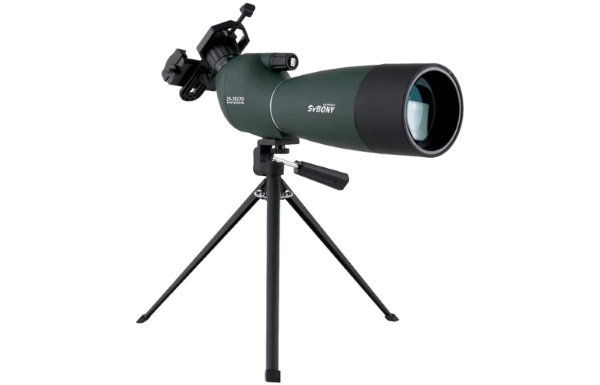This post shines a light on the best astronomy spotting scopes. These scopes feature excellent optical quality, high-quality build, and great magnification to deliver a memorable viewing experience.
The best astronomy spotting scopes are vital for observing stars, planets, and even deep-sky objects, as well as other celestial objects and phenomenon. They are pivotal for both amateur and professional astronomers since they may offer excellent views of the night sky.
When selecting an astronomy scope, it is fundamental you need to consider your unique needs and preferences. To help you make the right decision, we have amassed the best astronomy needs that are worth settling for. This way, the confusion from selecting from a myriad of options will be eliminated. Let’s have a look at the best models to pick from.
Best Astronomy Spotting Scopes
1) Gosky 20-60×80 HD Spotting Scope
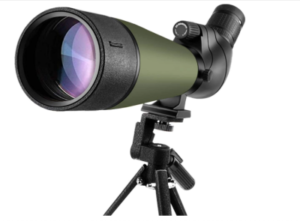
Gosky 20-60×80 HD Spotting Scope tops our list of the best astronomy spotting scopes. The spotting scope boasts a versatile 20-60x zoom that combines with a dynamic lens focusing system, enabling easy zooming in on the target.
The 80mm objective lens is fully multicoated to enhance light-gathering power resulting in bright, sharp, and clear images. The scope comes with a digiscoping adapter so that you can digiscope the distant galaxies and have maximum fun.
It is rubber armored for shockproofing and optimal protection. It has a robust Magnalium framework that withstands the tough conditions that you are bound to experience.
In addition, the Gosky HD is sealed for waterproofing so that rain, fog, and wet conditions will be the least of your concerns.
Another feature is the retractable sunshade that minimizes glare. The 45-degree eyepiece is adjustable to any viewing angle by simply loosening the adjustment collar on the body’s center.
Features
- 20-60x power
- 80mm objective lens
- Fully multi-coated optics
- Rubber armor construction
- Waterproof
- Includes a digiscoping adapter
Pros
- Great value
- Weatherproof
- Good accessories package
- Budget-friendly
Cons
- Fiddly digiscoping adapter
2) Celestron Ultima 80 20-60x Angled Spotting Scope
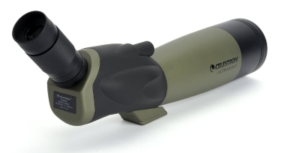
Celestron Ultima 80 20-60x Angled Spotting Scope is the next product on our review of the best astronomy spotting scopes. This series is a fantastic all-purpose optical device because it was made to function effectively in various viewing settings.
Since it is totally waterproof, you can use it confidently in inclement weather and love it for long-distance spotting and nature observation. In any natural setting, the green rubber optical tube enables unobtrusive observation.
This spotting scope has an angled design that makes it comfortable to use during prolonged viewing sessions, particularly when observing objects close to the horizon.
Furthermore, the scope includes a soft carry case that makes carrying and storage a breeze when not in use.
The 80mm objective lens on this spotting scope produces brilliant, distinct views of celestial objects. This lens is fully multi-coated to improve light transmission for high-quality images.
Additionally, it has a zoom eyepiece with a magnification range of 20x to 60x, making it ideal for both wide-angle and close-up viewing.
Anyone who wants a robust and versatile spotting scope for astronomy should get the Celestron Ultima 80 20-60x spotting scope.
Features
- 80mm objective lens
- BaK 4 prism
- Tripod compatible
- Filled with dry nitrogen gas
- Sight tube supports quick targeting
- Waterproof
- 20-60x magnification
- 45-degree viewing angle
Pros
- Bright and clear images
- Angled design enhances comfort
- Rugged build
- Ideal for all weather conditions
Cons
- The image quality may deteriorate at maximum power
- A bit bulky
3) Celestron Mini MAK 70mm Angled Spotting Scope
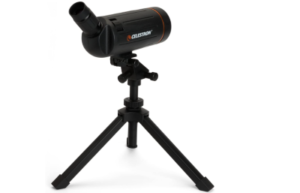
If you are an astronomer who is constantly on the go, the Celestron Mini MAK 70mm Angled Spotting Scope is ideal for you. The scope has a compact and lightweight design facilitating easy transportation and use. When not in use, storing the scope is hassle-free.
Another feature that supports easy transport is the soft carrying case. The tabletop tripod allows convenient setting up. Additionally, it works with most camera tripods, adding versatility and stability.
It is worth noting that the spotting scope has a Maksutov-Cassegrain optical system with a 70mm aperture that offers superb optical performance and clear, sharp views of celestial objects.
The angled eyepiece allows you to view comfortably, even for faraway objects. Overall,
Features
- 70mm objective lens
- Multicoated lenses enhance light transmission
- 25-75x magnification
- Waterproof
- Camera adaptable
- 45-degree viewing angle
Pros
- Lightweight and compact
- Advanced optical design
- A ton of accessories
- Easy to use
Cons
- High price
4) Bushnell Trophy Xtreme 20-60x65mm Spotting Scope
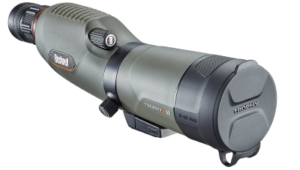
Another popular choice among astronomy enthusiasts is the Bushnell Trophy Xtreme 20-60x65mm Spotting Scope. A perk that makes this spotting scope stand out from competitors is the astounding optical performance that provides zero-distortion images with incredible brightness and sharpness. Even at maximum power, the scope maintains the quality of the image.
The optics are multicoated and combine with the BaK 4 prism glass to render sharp and detailed views of faraway targets. The 65mm objective lens also allows plenty of light to pass through, contributing to high-quality images. A carry case protects the scope.
Another highlight of the scope is its ease of use. There is a large focus knob that is easy to adjust, enabling quick and precise focusing. Another feature on the scope is the retractable sunshade, which minimizes glare and enhances image contrast.
Construction-wise, the spotting scope is well-built with durability in mind to survive rugged conditions and rough use. It will give you many years of long-lasting use.
Features
- BaK 4 prism
- Multicoated optics
- Large focus knob
- Retractable sunshade
- 65mm objective lens
- A protective carrying case
Pros
- Easy to use
- Great optical performance
- Sturdy build quality
Cons
- Less comfortable eyepiece
- A bit heavy
5) Emarth 20-60×60 AE Angled Spotting Scope
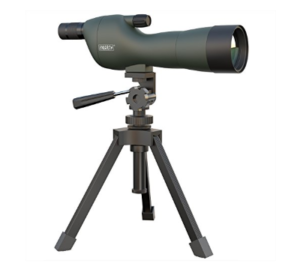
If you are a budget-conscious buyer looking for the best spotting scope for astronomy, the Emarth 20-60×60 AE Angled Spotting Scope is for you.
The 20-60x power is powerful and gives you clear images of the galaxy. The 45-degree eyepiece facilitates a more comfortable viewing session as you can adjust it to the angle that suits you best.
The spotting scope has a shockproof rubber armor housing that provides a non-slip grip. An integrated sunshade minimizes glare. In addition, the scope is O-ring sealed and nitrogen filled to keep away moisture and fog for reliable performance in all conditions.
Fully multi-coated lenses and Bak 4 roof prism heighten light gathering capability leading to sharp and bright images even in dismal lighting conditions. A dual-focus wheel system supports fast and fine-tuning focus adjustment enabling you to lock onto your target and zoom in for more detail. This comes in handy at long ranges.
You can mount the Emarth 20-60×60 on a tripod for a shake-free viewing. The tripod is made of aviation aluminum hence provides great stability to the spotting scope.
Overall, this spotting scope provides excellent optical performance and comes at a great price.
Features
- Tripod adjustable
- Rubber armor body
- 45-degree eyepiece
- Fully multi-coated lenses
- Bak 4 prism
- Dual focus wheel for fast adjustments
- 60mm objective lens
Pros
- Light and compact
- Essential accessories are included
- Price
- Long eye relief
Cons
- The eyepiece is not rotatable
6) Nikon ProStaff 5 Proscope 20-60x82mm Angled Spotting Scope
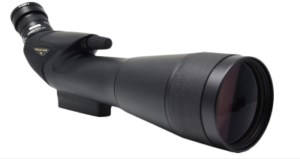
Nikon ProStaff 5 Proscope 20-60x82mm Angled Spotting Scope is a high-quality spotting scope that you need to carry with you in your next viewing session.
You can trust the scope to deliver bright and clear images even in dismal lighting conditions thanks to the wide power range and massive 82mm objective lens. The lens is fully multicoated to drink in ample light resulting in the best image images.
The scope suffices in all conditions because it is nitrogen filled for fog-free and waterproof performance. When viewing in bad weather conditions, you can be certain that the images will not be distorted.
The scope is lightweight yet rugged, so it will survive drops and accidents that may occur in the field.
An angled eyepiece design ensures comfortable viewing even in extended sessions. What’s more, the zoom eyepiece lens reduces color aberration at the edge of the field of view and gives you a long eye relief so that your viewing session is comfortable. The eyecup is adjustable based on your needs for a comfortable experience.
Features
- Nitrogen filled and O-ring sealed
- Angled eyepiece design
- Long eye relief
- 20-60x power range
- 80mm objective lens
- Fully multi-coated lenses
Pros
- Impeccable light transmission
- Lightweight
- Durable
- Weatherproof
Cons
- Pricey
Differences Between a Spotting Scope and Other Astronomy Gear
Spotting Scope Vs. Telescope
Spotting scopes are more portable, more element resistant, and lower in weight; hence easier to carry and easier to use compared to telescopes. On the other hand, telescopes provide higher magnification and have higher light-gathering power, making them more suitable for viewing far away planetory bodies.
Spotting Scope Vs. Binoculars
Spotting scopes provide substantially higher magnification than binoculars and superior digiscoping capabilities because of their more sophisticated optics. Conversely, binoculars offer a wider field of view and are more portable as they have a smaller make. Besides, their price is more approachable.
How To Choose the Best Spotting Scopes for Astronomy
Build Quality
Check how sturdy the spotting scope is to ensure it survives harsh conditions. It should be weatherproof for optimal performance across all conditions.
Also, check whether there is a cover to protect the scope. An extra layer of protection from inclement weather, scratches, and dust will keep the scope performing effectively regardless of what mother nature brings.
Glass Quality and Coating
The glass quality and coating are instrumental in determining the overall image quality. Look for ED or HD glass to avoid chromatic aberration and fringing at maximum power.
Also look for multi-coated or fully multicoated lenses with antireflection. This will prevent the loss of light that would result from reflection, making the images brighter and sharper in low light.
Eyepiece Rotation
A rotatable eyepiece provides more flexibility allowing you to use the spotting scope at different angles. It also enables easy and quick adjustments depending on your standing or sitting position, enhancing comfort when viewing for long sessions.
Objective Lens Diameter
The objective lens diameter is the size of the front lens. A larger objective provides more light resulting in a brighter image even in dismal lighting conditions. However, the bigger the objective lens, the more the weight of the spotting scope.
Also Read: 8 Best Budget Safari Binoculars
Best Astronomy Spotting Scopes FAQs
Q: Can I See Jupiter with a Spotting Scope?
A good spotting scope is suitable for viewing planets like Jupiter and Saturn. It can also be used to view open clusters and objects like the moon and the Mizar.
Q: Do You Need a Tripod with a Spotting Scope?
Spotting scopes often don’t require tripods as they are not very bulky. However, it would be a great idea to get a tripod that reaches a comfortable height for long viewing sessions while being heavy enough to offer the required stability for your scope.
Q: Can A Spotting Scope See Further Than Binoculars?
Spotting scopes boast high magnification than binoculars. This makes them provide better detail and clarity when viewing objects that are far away. Spotting scopes are usually mounted on a tripod for various applications such as astronomy, bird watching, wildlife viewing, target shooting, and many more.
Q: Are Spotting Scopes Ideal for Astronomy?
Yes, they are. Spotting scopes are designed with high power, often have robust build quality, work perfectly with digiscoping, and are super easy to move around with. All these features cement them as great devices for astronomy.
Conclusion
A spotting scope is a valuable device that will help you have a clear and detailed view of the skies. Be sure to check out the spotting scopes above for an unforgettable viewing session. All the models are solid performers and will not let you down.

